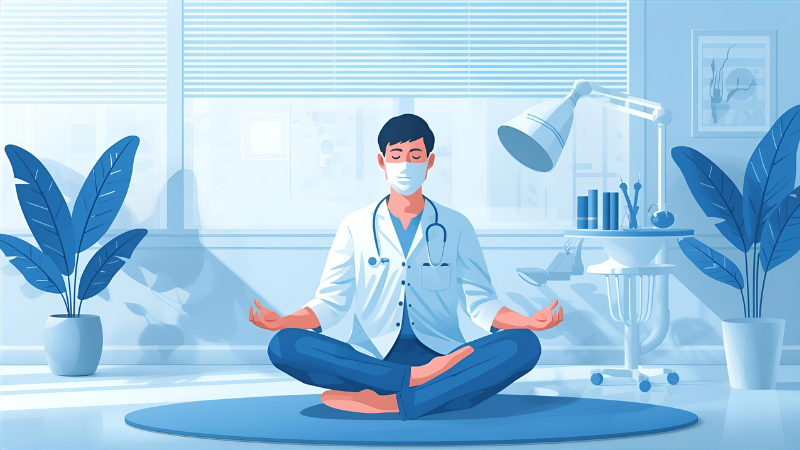Dentistry can be one of the most rewarding careers, but it can also feel surprisingly isolating. Many dentists spend most of their day in a small operatory, focused on patients, with little time to connect meaningfully with peers. While you may see people all day, it is not the same as being part of a supportive community where challenges, successes, and struggles are openly shared.
Professional isolation is more than a passing inconvenience. Research shows that loneliness and lack of peer support can increase stress, contribute to burnout, and even reduce career satisfaction. For dentists, who face high levels of responsibility and precision every single day, staying connected is not optional — it is essential for long-term wellbeing and growth.
The good news is that community can be built intentionally, even in a profession that often feels solitary. Here are strategies to help dentists break out of isolation, foster meaningful relationships, and feel supported in both their careers and personal lives.
Why dentists often feel isolated
Several factors make dentistry particularly prone to isolation:
- Solo or small practice environments: Many dentists work in single-chair practices or small teams, which limits opportunities for peer connection.
- Time pressures: Busy clinical schedules leave little room for networking or professional discussion.
- Professional silos: Unlike hospitals, where multiple specialties collaborate daily, general dentists may rarely interact with other clinicians unless they refer.
- Perfectionism and competition: Dentistry often attracts high-achieving, Type A personalities. While this drive fuels excellence, it can also create barriers to sharing vulnerability or admitting struggles.
- Geographic spread: In regional or rural areas, physical distance from colleagues can add another layer of isolation.
Recognising these dynamics is the first step to countering them. Isolation is common, but it does not have to be permanent.
The impact of isolation
Isolation in dentistry is not just about feeling lonely. It can have measurable effects on both mental health and clinical outcomes.
- Burnout risk: Dentists who lack social support are more likely to experience burnout and disengagement.
- Reduced learning: Without peer discussion, dentists may miss out on exposure to new techniques, technologies, or approaches.
- Lower resilience: Challenges such as difficult cases, patient complaints, or financial stress are harder to handle when faced alone.
- Career dissatisfaction: Feeling disconnected can make even successful practices feel unrewarding.
Community and connection act as buffers. Dentists who feel supported are better able to cope with stress, make confident decisions, and enjoy their work.
How to build community in dentistry
Building connection is not about being extroverted or networking at every event. It is about creating purposeful opportunities for support, growth, and shared experience.
- Join a study club or professional group
Study clubs provide a structured way to discuss cases, share challenges, and learn collaboratively. Look for local or online groups where dentists meet regularly to review cases or dive into specific topics. Even one monthly meeting can dramatically reduce professional isolation.
- Attend conferences with intention
Large events can feel overwhelming, but they are valuable chances to connect. Instead of trying to meet everyone, aim to build two or three meaningful connections. Follow up after the event with a message or call to turn acquaintances into lasting professional relationships.
- Engage in online dental communities
Global networks and online platforms now make it easy to connect with dentists across the world. Case discussions, live Q&A sessions, and mentorship programs can replicate the sense of belonging that might be missing in your local environment. The key is to participate actively rather than passively scrolling.
- Create peer accountability
Pair up with a colleague or small group of peers to set goals, review challenges, and keep each other accountable. These check-ins do not need to be formal. A short monthly call to discuss progress and roadblocks can provide encouragement and perspective.
- Seek mentorship
Mentorship is one of the strongest antidotes to isolation. A mentor offers guidance, reassurance, and wisdom, while mentees bring fresh perspectives. Both sides benefit. Look for formal mentorship programs or build informal mentoring relationships with dentists you admire.
- Build connection within your team
Your dental team can be a community too. Daily huddles, regular staff meetings, and shared learning sessions foster collaboration and reduce the sense of carrying the weight alone. Encourage open communication and celebrate small wins together.
Practical tips to stay connected day-to-day
- Schedule it: Treat peer connection like a clinical appointment. Book time each month for calls, study clubs, or catch-ups.
- Mix personal with professional: Some of the best support comes from talking about life beyond dentistry. Share experiences, hobbies, and challenges outside of work.
- Be open about struggles: Vulnerability creates real connection. Sharing a difficult case or stressful experience often opens the door for others to do the same.
- Give before you ask: Offer advice, encouragement, or resources to peers. Generosity strengthens professional bonds and builds reciprocal trust.
How community fuels professional growth
Beyond preventing loneliness, connection directly impacts career success.
- Better case outcomes: Case discussions reveal alternative approaches you may not have considered.
- Faster skill development: Learning from peers accelerates the application of new skills and technologies.
- Stronger confidence: Knowing you have a network behind you makes it easier to take on complex cases or leadership roles.
- Business resilience: Peer networks often share strategies for marketing, patient communication, or financial management.
Ultimately, community is not just a feel-good extra. It is a professional necessity that underpins both clinical and personal sustainability.
Isolation in dentistry is common, but it is not inevitable. With deliberate steps, you can build a support network that strengthens your wellbeing, sharpens your clinical skills, and makes your career more rewarding.
Whether it is through study clubs, conferences, online networks, or mentorship, the key is to engage consistently and meaningfully. Dentistry may demand focus and precision, but it does not have to be a lonely profession. When dentists connect, share, and support each other, everyone benefits; clinicians, practices, and patients alike.
You are not meant to do this alone. Build your community, and you will build both your career and your resilience.




